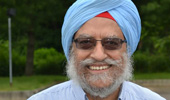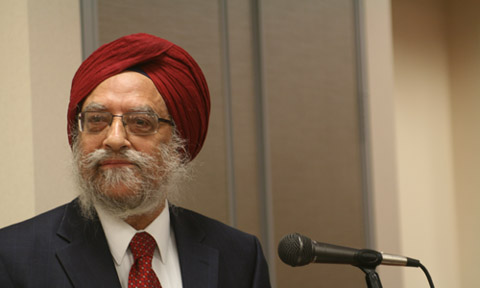Dr. Amritjit Singh, Langston Hughes Professor of English at Ohio University, is on a Fulbright-Nehru Award at the University of Delhi in India this academic year.
Singh is working on a personal and historical book tentatively titled “At Home Abroad: The Making of Minority Consciousness in India and the United States.” Among other things, the book will explore the meaning of being a South Asian as a global citizen from the 1940s to the present.
“My narrative and analysis of literature, film, and culture will focus in particular on the challenges of improving communication between the majority communities and minorities in both India and the United States,” Singh says. “While deeply personal, the book is not intended as an autobiographical work. It will include well-researched meditations on four particular historical moments that are also mirrored in my own personal and professional journey.”
This is Singh’s third Fulbright since coming to Ohio University in 2006, and the fourth in his academic career. He previously conducted research in Germany at Freie University in Berlin (2002), in Austria at Graz University (2007), and in Egypt at the University of Alexandria (2010).
A Personal Micro-Narrative and a Post-WWII History
Singh will use personal micro-narratives to introduce four historical chapters that will form a narrative of India and United States since World War II.
“Having been born in an American missionary hospital in British India, my own life has been shaped, as it were, by the idea of ‘America’ in relation to European colonial ventures around the world,” he says, “I have identified four dates in my own life as narrative organizing points for my book. While these four dates—1948, 1968, 1983 and 2001—are significant markers in my own intercontinental trajectory, each of them also evokes a significant historical moment in India and/or the United States to which I have felt compelled to respond in my own life and imagination.” For example, the Partition of British India in 1947 continues to have serious consequences for people’s lives on the Indian subcontinent in what some scholars have labeled the “Long Partition.”
“I haven’t read anything quite like what you propose here—such a synthesis of the macro and the micro, larger histories and personal stories, in a profoundly reflective voice. Its time has come,” says Professor Samina Najmi of California State University-Fresno in a message to Professor Singh.
Divisions of Caste, Religion, Language, and Region
As part of his research, Singh will examine documents and reports that have a bearing on the divisions of caste, religion, language, and region that have been traditionally part of India and examine how such categories were distorted or exacerbated by British colonial policy centered in the idea of “divide and rule.” His archival research will include research collections, academic libraries, and newspaper holdings in New Delhi, Hyderabad, Kolkata, and Chandigarh.
“An important leitmotif in the book would be my immersion in African American history and culture since 1970 and how my engagements in that field as a teacher-scholar have influenced my readings of South Asian history and culture in the 20th century.”
Singh is interested in minority communities in both countries whose historical memories and daily experiences are often quite distinct from those of the majority community in each location. He notes how the differing reactions of Americans to the recent tragic events in Ferguson, MO, highlight such gaps.
“How can we bridge the gap of lived experience and perception that exists between the minorities and the majority community? What role does unacknowledged privilege play in our relationship to the social and economic realities surrounding us? What might we do as citizens to foster a more cohesive sense of community and a fuller democratic participation by one and all?” Singh asks. He hopes that Mahatma Gandhi and Martin Luther King Jr. will remain vibrant figures in the future of both the largest democracy (India) and the oldest democracy (United States) in the world.
In many ways, Singh avers, “I hope in this book to bring together where I began my life with where I have been over the past five decades.” Coincidentally, his Fulbright-Nehru Award takes Amritjit Singh back to the same university, where he started his academic career as a young lecturer in 1965—the University of Delhi.




















2 Comments